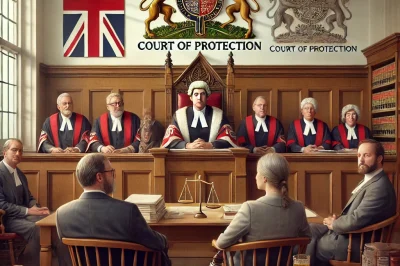Table of Contents

Key Takeaways
- The UK Court of Protection makes decisions for people who can’t make their own decisions.
- The court appoints deputies to manage financial, health, and welfare decisions.
- Anyone can apply to be a deputy, but family members are often chosen.
- Deputies must act in the best interests of the person they are helping.
- The court also handles disputes and emergencies involving vulnerable individuals.
Understanding the Court of Protection
The UK Court of Protection is a special court designed to make decisions for people who can’t make their own decisions. This usually involves elderly individuals or those with mental disabilities. The court was established under the Mental Capacity Act of 2005 and has the authority to make decisions about finance, property, health, and welfare.
Most importantly, the Court of Protection can appoint a deputy to act on behalf of someone who lacks mental capacity. This is crucial for families who want to ensure that their loved one’s needs are met. The court also settles disputes about mental capacity and can make urgent decisions when necessary.
| Role | Description |
|---|---|
| Decision-making | Makes decisions on behalf of people who lack mental capacity to make their own decisions12 |
| Appointing deputies | Appoints deputies to manage the affairs of individuals who lack capacity14 |
| Health and welfare | Makes decisions about medical treatments, living arrangements, and care for incapacitated individuals1 |
| Financial affairs | Manages property and financial matters for those unable to do so themselves13 |
| Safeguarding | Protects vulnerable adults from financial abuse and exploitation1 |
| Resolving disputes | Settles disagreements about the best interests of incapacitated individuals2 |
| Overseeing deputies | Monitors and supervises court-appointed deputies2 |
| Legal powers | Grants legal authority to make decisions on behalf of incapacitated individuals34 |
| Statutory wills | Considers applications to create or modify wills for those lacking capacity4 |
| Mental capacity assessment | Determines whether someone has the mental capacity to make specific decisions4 |
The Importance of Mental Capacity
Mental capacity refers to the ability to make decisions for oneself. When someone lacks this capacity, they can’t understand, remember, or weigh up information to make a decision. This can be due to conditions like dementia, learning disabilities, or brain injuries.
Understanding mental capacity is vital for families. It helps determine whether a person can make their own decisions or if they need someone else to make decisions for them. The Court of Protection uses specific guidelines to assess mental capacity, ensuring that decisions are made in the person’s best interests.
Besides that, it’s important to know that mental capacity can change over time. Someone might be able to make some decisions but not others. Therefore, assessments are usually specific to the type of decision being made, which can help avoid common mistakes.
Appointing a Deputy
When a loved one can’t make their own decisions, the Court of Protection can appoint a deputy. This person is responsible for making decisions on behalf of the incapacitated individual. The process involves several steps, but it ensures that the person’s best interests are always prioritized.
Who Can Be a Deputy
Anyone can apply to be a deputy, but the court often prefers close family members. However, in some cases, a professional deputy like a solicitor might be appointed. The key is that the deputy must act in the best interests of the person they are helping.
Here are some common types of deputies:
- Family Members: Often the first choice, as they usually know the person best.
- Friends: Close friends can also be appointed if they have a good relationship with the person.
- Professional Deputies: These are usually solicitors or other professionals who are paid to act as deputies.
Responsibilities of a Deputy
Deputies have a range of responsibilities, depending on what the court decides. They might manage the person’s finances, make healthcare decisions, or handle daily living arrangements. The deputy must always act in the best interests of the person they are helping.
Some key responsibilities include:
- Financial Management: Handling bank accounts, paying bills, and managing investments.
- Healthcare Decisions: Deciding on medical treatments or care plans.
- Welfare Decisions: Making choices about where the person lives and their daily care needs.
Every year, deputies must report to the Court of Protection about the decisions they’ve made. This ensures transparency and accountability.
How to Apply for Deputyship
Applying to be a deputy involves several steps. First, you need to complete an application form and submit it to the Court of Protection. You’ll also need to provide a medical report confirming that the person lacks mental capacity.
Here’s a step-by-step guide:
- Complete the application forms, including details about the person and why they need a deputy.
- Obtain a medical report from a doctor to confirm the person’s lack of mental capacity.
- Submit the application to the Court of Protection along with the medical report.
- Pay the application fee, which is usually around £365.
- Wait for the court’s decision, which can take several weeks.
Once approved, the court will issue an order appointing you as the deputy. You’ll then be able to make decisions on behalf of the person.
Decisions Managed by the Court
The Court of Protection handles a wide range of decisions to ensure the welfare and financial stability of those who can’t make decisions for themselves. These decisions can be broadly categorized into financial, healthcare, and emergency decisions.
Financial Decisions
Financial decisions are among the most critical responsibilities managed by the Court of Protection. These decisions can include managing bank accounts, paying bills, and even selling property to ensure the person’s financial well-being. The court can also oversee investments and ensure that any financial decisions are made in the best interest of the individual.
For example, if an elderly person with dementia can no longer manage their finances, the court can appoint a deputy to take over these responsibilities. This ensures that the person’s bills are paid on time and their assets are managed wisely.
Healthcare and Welfare Decisions
Besides financial decisions, the Court of Protection also makes crucial healthcare and welfare decisions. These can include choices about medical treatments, care plans, and living arrangements. The court ensures that these decisions are made with the person’s best interests in mind.
For instance, if an individual is unable to decide whether to undergo a particular medical treatment, the court can step in and make that decision. The court consults medical professionals and considers the person’s past wishes and current needs.
Emergency Decisions
There are times when immediate decisions are required, and the Court of Protection is equipped to handle such emergencies. Whether it’s an urgent medical procedure or an immediate change in living arrangements, the court can make swift decisions to protect the individual’s well-being.
For example, if an elderly person suddenly loses the ability to live independently, the court can quickly arrange for them to be moved to a care home. This ensures that they receive the necessary care without delay. To understand more about this process, you can read about navigating the maze of the Court of Protection.
Deprivation of Liberty Safeguards (DoLS)
Deprivation of Liberty Safeguards (DoLS) are essential to protect the rights of individuals who are unable to make decisions for themselves. These safeguards ensure that any restrictions on a person’s freedom are lawful and in their best interests.
When DoLS Apply
DoLS apply when an individual is deprived of their liberty for their own safety or well-being. This can occur in settings like care homes, hospitals, or supported living arrangements. The key is that the deprivation must be necessary and proportionate to the risk of harm.
For instance, if a person with severe dementia is wandering and at risk of harm, they might be restricted to a secure area within a care home. This restriction would be considered a deprivation of liberty, and the care home must follow DoLS procedures to ensure it is lawful.
It’s important to note that DoLS only apply when the person lacks the capacity to consent to these arrangements. Therefore, a thorough assessment of mental capacity is required before implementing any restrictions.
Ensuring Individual Rights
The primary aim of DoLS is to protect individual rights. This includes ensuring that the person is not unlawfully deprived of their liberty and that any restrictions are in their best interests. The safeguards also provide a mechanism for challenging decisions and seeking a review if necessary.
For example, if a family member believes that the restrictions placed on their loved one are excessive, they can request a review by the Court of Protection. The court will then assess whether the deprivation of liberty is justified and make any necessary adjustments.
Statutory Wills
A Statutory Will is a will made by the Court of Protection on behalf of someone who lacks the mental capacity to make their own will. This ensures that the person’s assets are distributed according to their wishes and in a manner that reflects their best interests.
What is a Statutory Will?
A Statutory Will is created when an individual cannot make or change their own will due to a lack of mental capacity. The Court of Protection steps in to create a will that reflects what the person would have wanted, based on available evidence and the best interests of the individual.
Some situations where a Statutory Will might be necessary include:
For instance, when preparing for the unexpected, it’s crucial to consider a Financial LPA as part of your planning.
- When there is no existing will, and the person lacks the capacity to create one.
- When the existing will is outdated and no longer reflects the person’s wishes or circumstances.
- When there are disputes among family members about the distribution of the person’s assets.
How to Apply for a Statutory Will
Applying for a Statutory Will involves several steps, starting with a formal application to the Court of Protection. This application must include detailed information about the person’s assets, their family situation, and any existing wills or estate plans.
Here’s a step-by-step guide to applying for a Statutory Will:
- Complete the application forms, providing details about the person and their assets.
- Include a medical report confirming the person’s lack of mental capacity.
- Submit the application to the Court of Protection along with any supporting documents.
- Pay the application fee, which is usually around £400.
- Wait for the court’s decision, which can take several weeks.
Once the court approves the application, it will issue an order creating the Statutory Will. This ensures that the person’s assets are distributed according to their best interests and any known wishes.
Challenges and Disputes
Despite the best efforts of the Court of Protection, there can still be challenges and disputes. These often arise when family members disagree about what is in the best interests of the person or when there are concerns about the actions of a deputy.
Challenging a Decision
If you disagree with a decision made by the Court of Protection, you have the right to challenge it. This can be done by applying for a review or appealing the decision. The court will then reassess the situation and make any necessary changes.
For example, if you believe that a deputy is not acting in the best interests of your loved one, you can request a review. The court will investigate the deputy’s actions and decide whether any changes are needed.
It’s essential to provide clear evidence to support your challenge. This might include medical reports, financial records, or statements from other family members.
“The Court of Protection ensures that decisions are made in the best interests of those who cannot make their own decisions. However, it’s crucial to monitor these decisions and challenge them if necessary to protect your loved one’s rights.” – Mental Capacity Act 2005
Disagreements Within Families
Disagreements within families are common when it comes to making decisions for a loved one who lacks mental capacity. These disputes can be emotionally charged and challenging to resolve.
The Court of Protection can help mediate these disputes and make decisions that are in the best interests of the person. It’s important to communicate openly and honestly with other family members and seek legal advice if needed.
Legal Aid and Support
Legal aid is available for those who need help with Court of Protection cases but cannot afford legal fees. This can cover the cost of legal representation and other related expenses.
To apply for legal aid, you must meet specific financial criteria. It’s also essential to demonstrate that the case has merit and is in the best interests of the person involved.
There are also several support organizations that can provide advice and assistance. These include Age UK, the Alzheimer’s Society, and the Office of the Public Guardian.
Rights and Safeguards
Legal Aid and Support
Legal aid is available for those who need help with Court of Protection cases but cannot afford legal fees. This can cover the cost of legal representation and other related expenses. To apply for legal aid, you must meet specific financial criteria. It’s also essential to demonstrate that the case has merit and is in the best interests of the person involved.
There are also several support organizations that can provide advice and assistance. These include Age UK, the Alzheimer’s Society, and the Office of the Public Guardian. These organizations offer a wealth of resources, including legal advice, support groups, and information on navigating the Court of Protection process.
Rights and Safeguards
- Ensuring decisions are made in the best interests of the individual
- Providing a mechanism for challenging decisions
- Offering legal aid for those who cannot afford representation
- Monitoring the actions of deputies to ensure compliance
- Protecting individual rights through Deprivation of Liberty Safeguards (DoLS)
The Court of Protection plays a crucial role in protecting the rights of vulnerable individuals. It ensures that decisions are made in their best interests and provides a mechanism for challenging those decisions if necessary. Legal aid is available for those who need it, and the court monitors the actions of deputies to ensure compliance.
Besides that, the court also implements Deprivation of Liberty Safeguards (DoLS) to protect individuals who are deprived of their liberty. These safeguards ensure that any restrictions on a person’s freedom are lawful and in their best interests.
It’s important to remember that the Court of Protection is there to help. If you have concerns about a loved one’s care or financial management, don’t hesitate to seek advice and support. There are many resources available to help you navigate this complex process.
Protecting Vulnerable Individuals
Protecting vulnerable individuals is the primary goal of the Court of Protection. The court ensures that decisions are made in the best interests of those who cannot make their own decisions. This includes appointing deputies, overseeing financial and healthcare decisions, and implementing safeguards like DoLS.
For example, if an elderly person with dementia is at risk of financial exploitation, the court can appoint a deputy to manage their finances. This ensures that the person’s assets are protected and used for their benefit. For more information on how this process works, you can read about understanding the Court of Protection.
Ensuring Fair Treatment
The Court of Protection is committed to ensuring fair treatment for all individuals. This includes providing a mechanism for challenging decisions and offering legal aid for those who need it. The court also monitors the actions of deputies to ensure they are acting in the best interests of the person they are helping.
For instance, if a family member believes that a deputy is not acting in the best interests of their loved one, they can request a review by the court. The court will investigate the deputy’s actions and make any necessary changes to protect the individual’s rights.
Conclusion: Making Informed Decisions
“The Court of Protection ensures that decisions are made in the best interests of those who cannot make their own decisions. However, it’s crucial to monitor these decisions and challenge them if necessary to protect your loved one’s rights.” – Mental Capacity Act 2005
Making informed decisions is essential when it comes to caring for a loved one who cannot make their own decisions. The Court of Protection provides a framework for ensuring that these decisions are made in the best interests of the individual. By understanding the court’s role and the processes involved, you can help protect your loved one’s rights and well-being.
It’s also important to seek support and advice from organizations like Age UK, the Alzheimer’s Society, and the Office of the Public Guardian. These organizations offer valuable resources and can help guide you through the Court of Protection process.
Remember, the Court of Protection is there to help. If you have concerns about a loved one’s care or financial management, don’t hesitate to seek advice and support. There are many resources available to help you navigate this complex process and ensure that your loved one’s best interests are always prioritized.
Frequently Asked Questions (FAQ)
What is the primary function of the Court of Protection?
The primary function of the Court of Protection is to make decisions for individuals who lack the mental capacity to make their own decisions. This includes decisions about finance, property, health, and welfare. The court also appoints deputies to act on behalf of these individuals and ensures that all decisions are made in their best interests.
Who can apply to be a deputy?
Anyone can apply to be a deputy, but the court often prefers close family members. In some cases, a professional deputy like a solicitor might be appointed. The key is that the deputy must act in the best interests of the person they are helping. The application process involves completing forms, providing a medical report, and paying an application fee. For more details on the process, you can learn about understanding the Court of Protection.
How are emergency decisions handled?
Emergency decisions are handled swiftly by the Court of Protection to ensure the immediate safety and well-being of the individual. Whether it’s an urgent medical procedure or a sudden change in living arrangements, the court can make quick decisions to protect the person’s interests. These decisions are made based on available evidence and the best interests of the individual. For more information on safeguarding your future, see securing your future with a health and welfare LPA.
What are deprivation of liberty safeguards?
Deprivation of Liberty Safeguards (DoLS) are measures to protect individuals who are deprived of their liberty for their own safety or well-being. These safeguards ensure that any restrictions on a person’s freedom are lawful and in their best interests. DoLS apply in settings like care homes, hospitals, and supported living arrangements, and require a thorough assessment of mental capacity before implementation.
By understanding the role of the Court of Protection and the processes involved, you can help ensure that your loved one’s rights and well-being are protected. Seek support and advice from organizations like Age UK, the Alzheimer’s Society, and the Office of the Public Guardian to navigate this complex process effectively.
The UK Court of Protection plays a crucial role in making decisions for individuals who lack the mental capacity to make decisions for themselves. This court can appoint deputies to manage the financial and personal welfare matters of such individuals. Understanding the procedures and intricacies of the Court of Protection is essential for families and professionals involved in the care of vulnerable individuals. For a deeper understanding, you can read more about navigating the maze of the Court of Protection.
- What Happens If There’s No Will? Intestacy Rules Explained – 24 January 2026
- Can a Solicitor Speed Up Probate? When Professional Help Makes Sense – 21 January 2026
- Probate vs Letters of Administration: Swansea Legal Solutions Explain the Differences? – 18 January 2026






